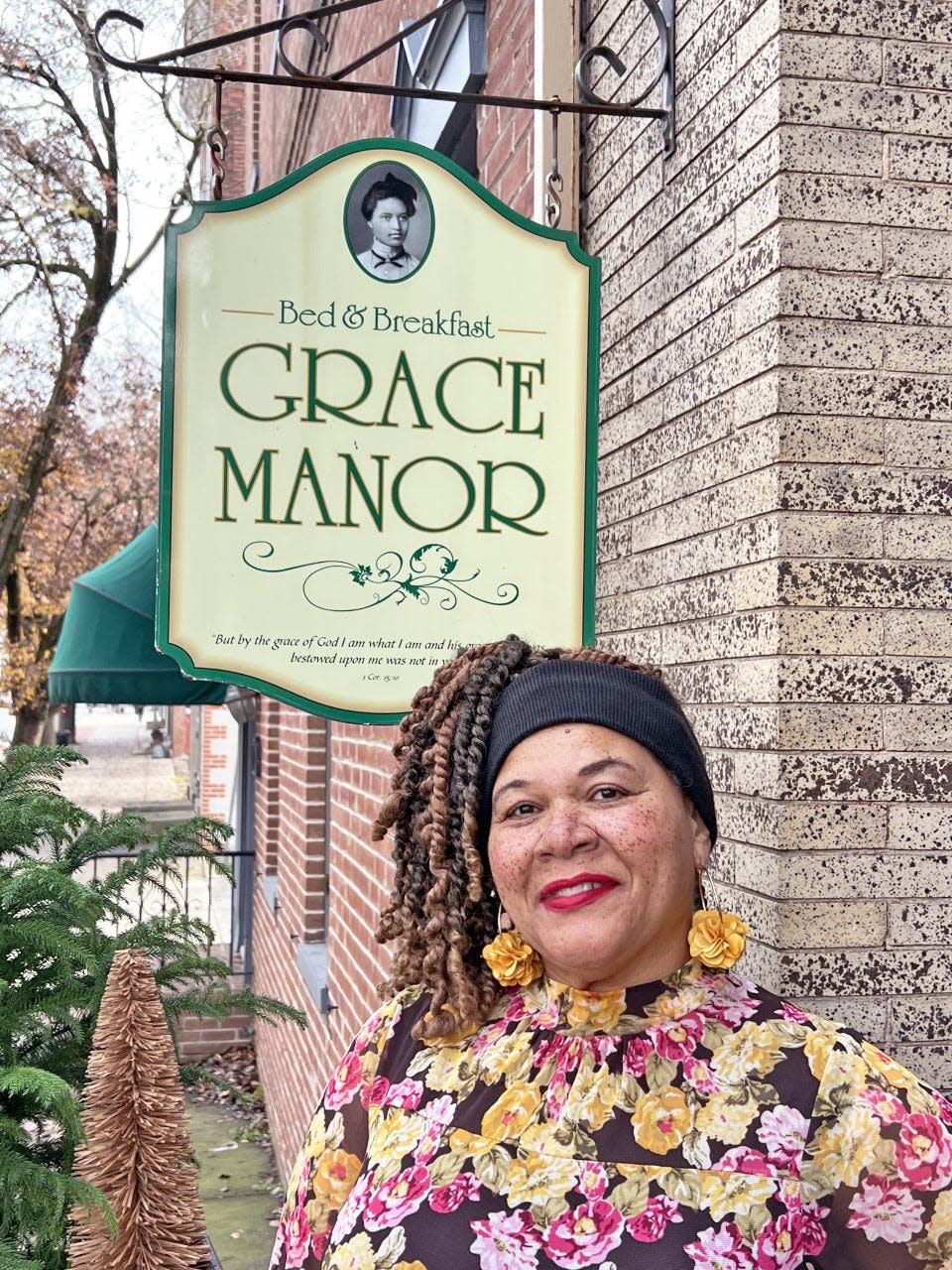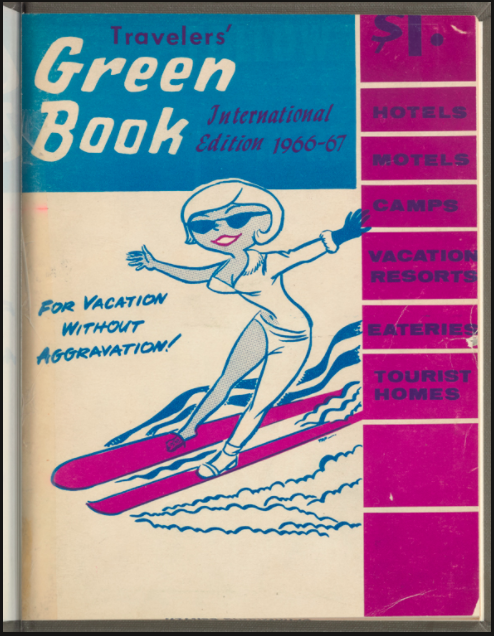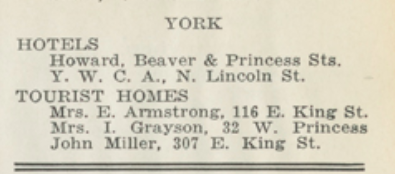Sojourn Noir Initiative promotes rest, refuge and enjoyment for Black travelers
A handsome, four-story building stands in York’s WeCo District, a short walk from the West Market Street Bridge.
A sign marks the spot, Grace Manor. And a picture of a woman also appears on the bed and breakfast’s sign. “Grace” was the name of owner Joanne Wilmore’s grandmother, and the image shows Wilmore’s great-grandmother, Ethel.
“These matriarchs spent their lives working for others with little to no intentionally built space for their own rest, refuge and enjoyment,” Wilmore wrote on the website of a just-launched initiative “Sojourn Noir.”
The initiative, supported with a grant from the York County Community Foundation, will promote Black tourism in York, the region and nationally.
“We partner with local retailers, restaurants, the hospitality and tourism industry to help create inviting spaces and experiences in York …,” the Sojourn Noir website states, “where Black travelers feel respected, welcome and inspire a sense of belonging.”

Time for change
Wilmore, a Baltimore native, bought the turn-of-the-20th-century home, in 2007 after, according to a Washington Post review, “a two-decade journey to open her B&B ended with the perfect property in York, PA.”
Indeed, it has been the right property for Wilmore. She has hosted scores of business travelers and vacationing families, and even a few notable guests. And those just passing through from one place to another who prefer a bed-and-breakfast experience have enjoyed her rooms decorated in French, Asian, African Diaspora and other themes.
For years, she has thought about Black travelers, an important part of her customer base.
She’s learned from American history that African-Americans have purposely been denied self-care practices of rest, luxury and leisure. That includes the opportunity to travel.
“It is beyond time to change that,” as she says on the Sojourn Noir website.

In the Green Book
Interestingly, a landmark farther east on Market Street served as an example of a place that denied Black travelers overnight accommodations in its early years – the recently restored and reopened Yorktowne Hotel.
In fact, Jim Crow visited the Yorktowne at the time of its 1925 construction - with separate restrooms for Black and white employees.
Yet there was a measure of redemption. Things changed.
The hotel was listed in the Green Book, a guide for Black travelers starting in 1957, and has supplied artifacts to the Smithsonian for an exhibit on the Green Book and travel of Black people.

About Sojourn Noir
So in 2023, what are Sojourn Noir’s goals seeking to improve travel for Black people on the local scene and beyond? We posed questions to Wilmore to learn more about this York-based initiative:
Q. Will you please explain Sojourn Noir, your goals at first and down the road? What gap or need do you see this project filling?A. Sojourn Noir inspires Black people to engage in the inalienable right to leisure travel. Simply stated our goal is to: Positively impact the number of Black travelers considering and/orvisiting York County. Bring a new narrative and present York County’s attractions andamenities in a platform created specifically in response to their perspective as Black travelers.
Sojourn Noir's culturally informed training works collaboratively with local businesses to foster environments that are respectful, welcoming and inspire a sense of belonging to Black travelers.Sojourn Noir believes that in order to eradicate the vestiges of past efforts to thwart the rights of African Americans to pursue leisure, we must intentionally and consistently make efforts to build spaces that are respectful, welcoming and inspire a sense of belonging. While promoting York as a destination, Sojourn Noir develops the conversation from the perspective of people who have historically experienced racial inequity, with the goal of moving us forward.
Racial equity will be advanced within York County’s travel and tourism industry through a trademarked affiliate membership program “Bring Yourself Here,” culturally informed tourism training and conferences, seminars and workshops. In 2018 travelers spent almost $8.9 billion in the Dutch County Roads region (Adams, Berks, Cumberland, Dauphin, Franklin, Lancaster, Lebanon, Perry, and York), the second highest amount of the state’s 11 tourism regions.
Yet, in the same year, a mere 4% of overnight visitors in the region were Black or Latino, compared to more than 10% nationally. Sojourn Noir presents an opportunity for Black visitor growth in York County.
Q. Your website tells the story of Black people and leisure travel. Could you fill us in? Also, can you explain self care in this connection?
Tourism has a great contextual relevance and importance to African Americans. As enslaved people, we were forbidden to travel about freely in this country.
Today, we spend more than 100 billion dollars in U.S. travel, yet we often encounter racism as we traverse American highways. In a recent survey conducted in 2022 by MMG Global, the largest tourism marketing research firm, 46% of Black travelers said that they felt unwelcome in destinations they traveled.
Additionally, destination marketing organizations have not spent the marketing dollars to attract Black people to destinations that they deserve to have spent on them. Tourism, as many other consumer-based industries, ignores and takes for granted Black consumers and their immense spending capacity.Sojourn Noir defines self care as the purposeful and intentional stepping away from systems of oppression, whose purpose is to keep one too exhausted, frustrated and distracted to have space to dream, imagine, and actualize freedom.
It includes but is not limited to nourishment from food, relationships and environment as well as the savoring of play, leisure, hobbies and, of course, rest and sleep.Q. In some ways, Sojourn Noir reminds one of a digital Green Book, particularly in its affiliate membership part. Please talk about this comparison.A. The Green Book was literally a lifeline for Black travelers. It provided a repository of safe places for African Americans to travel and dine in the United States prior to desegregation. Most places in the Green Book were owned and operated by African Americans.
There were also white establishments that allowed entry into their businesses, often through back doors or allowing Black people to use substandard facilities. With the passage of the 1964 Civil Rights Act outlawing discrimination, doors that were previously locked and barred Black people from entering were now open.
Unfortunately, open doors did not mean a welcoming entry. Sojourn Noir amplifies the voices of Black leisure travelers to encourage local businesses and attractions to create an atmosphere where Black travelers can fully enjoy York County, feeling respected, welcome, and experiencing a sense of belonging.
Through its affiliate membership program, Sojourn Noir partners with local retailers, restaurants, the hospitality and tourism industry to help create inviting spaces and experiences in York County for Black travelers.Q. Interestingly, the Yorktowne Hotel was represented in the Green Book as early as 1957. Does the Yorktowne show promise in offering a business relationship with Sojourn Noir?A. Sojour Noir's goal is to help York businesses become culturally informed as it relates to the Black tourism and the hospitality industries.
We recently met with Michael Blum, the general manager for The Yorktowne. We had an engaging and enthusiastic dialog and look forward to establishing a formal collaborative partnership.
Q. While Sojourn Noir has a national scope, how do you see it benefiting York County?A. York is the initial launch destination for Sojourn Noir. We promote Black tourism to York County, a county rich with culture, history and a community of creators - and with close proximity to major cities like Philadelphia, Baltimore and Washington D.C.
Sojourn Noir's proprietary research shows that Black women, ages 35-64 and residing in the Mid-Atlantic region, are Sojourn Noir’s primary audience for travel to York. Of the survey respondents, 70%+ stated destinations that represent their culture are important in creating a sense of welcome.
This coupled with the fact that “Black cultural leisure travelers” - those seeking experiences, places, events, cuisine, etc. reflective of Black culture - spend more than any other travel demographic is reason to highlight York County’s depth of African American cultural history.
It offers an opportunity to co-market and promote cultural experiences with organizations and historic sites, including the William C. Goodridge Freedom Center, future Crispus Attucks History and Culture Center, Explore York's African American Cultural Trail, York County History Center, Northern York County’s Baptist Farm where Harriet Tubman visited, historically Black Lebanon Cemetery and Mifflin House, a former Underground Railroad site. These sites and more offer an opportunity for a curated cultural travel experience for Black people.
You can support Sojourn Noir by visiting us at sojournnoir.com, following us on Facebook and joining our email list.
Jim McClure is a retired editor of the York Daily Record and has authored or co-authored nine books on York County history. Reach him at jimmcclure21@outlook.com.
More:Dealing with York County's identity crisis
More:Comings and Goings: York marketing group seeks to engage Black people in leisure travel
This article originally appeared on York Daily Record: Sojourn Noir Initiative promotes rest, enjoyment for Black travelers

